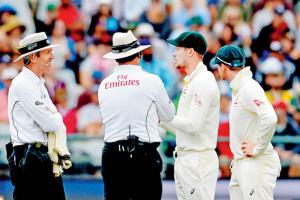Post Sandpapergate, Australia has had Integrity/Cultural Reviews, Player Charters and promises of leaves being turned over but it has had zero effect at grassroots levels

Australia's Cameron Bancroft (second from right) is questioned by umpires Nigel Llong (left) and Richard Illingworth on Day Three of the third Test against South Africa at Cape Town in March 2018. Pic/AFP
 Sometimes you have to surrender before you can think about winning. Twelve months ago, Australia surrendered more than the moral high ground in the shadows of Table Mountain in Cape Town. They surrendered their captain, vice-captain and their coach. Not long after, they surrendered their head of Integrity.
Sometimes you have to surrender before you can think about winning. Twelve months ago, Australia surrendered more than the moral high ground in the shadows of Table Mountain in Cape Town. They surrendered their captain, vice-captain and their coach. Not long after, they surrendered their head of Integrity.
ADVERTISEMENT
How ironic! And soon after, they surrendered their long-time CEO. Well, to be honest, he jumped ship a few days before a damning Cultural Review was released. It's not always the case that surrenders and cowardice are best friends but this time.
Oz, a threat at World Cup
Here we are, one year later. Australia are now genuine World Cup threats again. Almost unthinkable a few months ago when India laid waste to them in all formats and when there were dark mutterings about a dearth of options to fill a gaping void. Now, it's a matter of how the selectors can fit 20 viable candidates into 15 slots. The darkest hour is just before the dawn.
At the coalface of Australian cricket, far from the first-class arenas, everything has changed. And nothing has changed. We've had Integrity/Cultural Reviews, Player Charters and promises of leaves being turned over but it has had zero effect at grassroots levels. The behaviour exhibited at everything from U-10's through to grade cricket, men and women, have actually worsened according to many involved in running cricket administrations. This season has been amongst the worst I have ever witnessed in terms of mindless sledging, blatant cheating and a total disregard for the concept of integrity. It's almost as if the ordinary cricketer lost so much respect for the national team that even when their behaviour began to improve, the masses simply refused to follow. Cultural change can often defy gravity.
My observations are largely first-hand. As a junior umpire, a senior coach, an occasional player and the parent of three young cricketers playing at representative levels, I have seen little evidence that the fall-out from the shame of Cape Town has left a stain on the collective conscience of the cricket community. Perhaps the stain has been rubbed out with sandpaper.
On a weekly basis, without exaggeration, I have witnessed behaviour that should shame the sport but rarely attract much more than the resigned "this is normal" sort of response. At my club, one of the largest grade clubs in Australia, two senior players in their 40's, have been suspended for repeat offences that eventually led to them walking away from the game forever (hopefully). Tellingly, the worst examples of bad behaviour are coming from the older brigade for whom Sandpapergate was merely an unfortunate case of getting caught. They refuse to accept that change is necessary — the only signs of them moving with the times is to use mental health excuses to explain away their vile brain snaps.
No lessons learnt
You'd think that the Phil Hughes incident would have changed sledging forever. Not so. Only recently, a bowler had to be cautioned for threatening to kill a batsman with a bouncer. Not long after, the umpires had to put the entire fielding team on warning. In 30-plus years of playing grade cricket, I have never witnessed a team warning. The club president was watching on with a gentle smile, presumably oblivious to all those memos from Cricket Australia about drawing a line in the sand about player behaviour blah, blah, blah.
Catch up on all the latest sports news and updates here. Also download the new mid-day Android and iOS apps to get latest updates
 Subscribe today by clicking the link and stay updated with the latest news!" Click here!
Subscribe today by clicking the link and stay updated with the latest news!" Click here!






